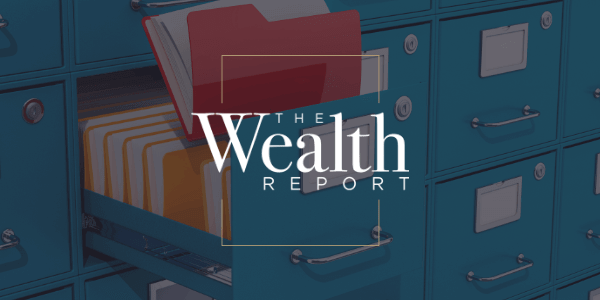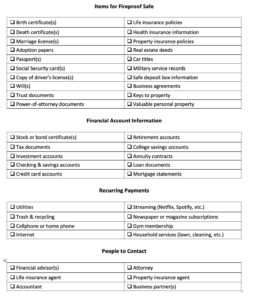AEWM Wealth Report – Giving the Gift of Organization

Download PDF Version
Giving the Gift of Organization
Make it easy for loved ones to find important documents with this handy checklist.
Do your loved ones know where your important documents are located or whom to call for help after you’re gone? Use this checklist to get organized.
Overview
From a birth certificate and driver’s license to account statements and property titles, all of us are holding onto important documents showing proof of identity and property ownership. And while you know (or think you know) where these documents are located, do your loved ones know where to get the information they need to make decisions on your behalf?
A 2022 study revealed more than 50% of Americans think estate planning is important, yet only 33% have a will or living trust in place. The reason? Most say they don’t have enough assets to justify the cost and effort of putting those documents in place.1
But what most of us do have is an assorted collection of accounts, property and even bills. If you’re gone or disabled, someone (usually a spouse, adult child or trusted friend) needs to have access to documents related to these items or know whom to call for help. One of the best things you can do for that person is to organize your documents — and then let him or her know where to find everything needed when the time comes.
Organizing Your Information
Where do you even begin with organizing your important documents? It’s good to start by breaking them down into two categories: offline and online.
Offline Documents
Your offline documents could include property titles, insurance policies, passports, birth or death certificates, marriage licenses, etc. Instead of stashing these in a drawer or file cabinet, it’s a good idea to store them in a fireproof safe in your home. It’s also smart to make copies of items that reside in your wallet — such as a driver’s license or Social Security card — and put those in the fireproof safe as well.
If you get paper statements for banking or investment accounts, there’s no need to hold on to all of your statements. Keep an organized folder or file with the latest statement and shred the old ones. Better yet, set up online access for all your financial accounts and give your login information to your loved ones. Which brings us to …
Online Documents
Online bill payments. Social media profiles. Your Netflix account. In a digital world, it’s important to also keep track of your online information and how to access it. One way to share your login details: Make a list of your account usernames and passwords, then store the list in your fireproof safe. Another option is to use a password manager such as Last Pass and share the login details electronically with the person responsible for managing your affairs.
Get Started
To get started, we’ve put together this handy checklist to help make sure you’ve gathered everything. You can even use the checklist to make notes, so whoever is reading it knows exactly which documents to look for in the safe, file drawer or computer.
If you need help collecting any of these documents, contact your financial professional. They can assist with tracking down account numbers or latest statements.
Once you’ve completed the checklist, share it with your designated person(s) or let them know where they can find it when they need it. Please keep in mind that this may not be an all-encompassing list, and individual needs may vary.

SOURCES
1 Daniel Cobb. Caring.com. “2022 Wills and Estate Planning Study.” https://www.caring.com/caregivers/estate-planning/wills-survey/. Accessed Sept. 14, 2022.
This content is provided for informational purposes. It is not intended to be used as the sole basis for financial decisions, nor should it be construed as advice designed to meet the particular needs of an individual’s situation. None of the information contained herein shall constitute an offer to sell or solicit any offer to buy a security. Individuals are encouraged to consult with a qualified professional before making any decisions about their personal situation. The information and opinions contained herein provided by third parties have been obtained from sources believed to be reliable, but accuracy and completeness cannot be guaranteed by AE Wealth Management. Neither AEWM nor the firm providing you with this report are affiliated with or endorsed by the U.S. government or any governmental agency. Investing involves risk, including the potential loss of principal. No investment strategy can guarantee a profit or protect against loss in periods of declining values. AE Wealth Management, LLC (“AEWM”) is an SEC Registered Investment Adviser (RIA) located in Topeka, Kansas. Registration does not denote any level of skill or qualification. The advisory firm providing you this report is an independent financial services firm and is not an affiliate company of AE Wealth Management, LLC. AEWM works with a variety of independent advisors. Some of the advisors are Investment Adviser Representatives (IARs) who provide investment advisory services through AEWM. Some of the advisors are Registered Investment Advisers providing investment advisory services that incorporate some of the products available through AEWM. Information regarding the RIA offering the investment advisory services can be found at http://brokercheck.finra.org.
9/22-2425001
